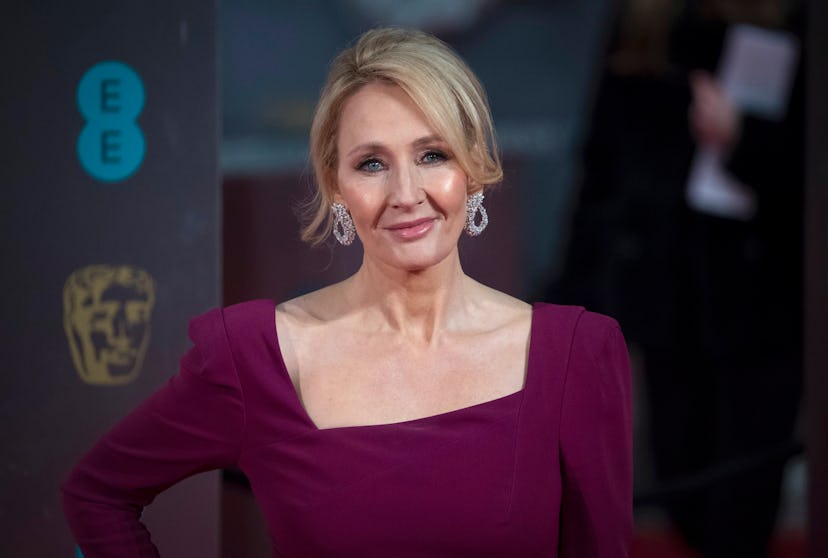“What’s a TERF?” And Other Things You Need to Know to Understand the J.K. Rowling Controversy
"Harry Potter" author J.K. Rowling has reignited a longstanding trans-excslusioniary view of sex and gender in a series of tweets over the weekend.

J.K. Rowling managed to spring an entire world of witchcraft and wizardry from her mind, but apparently can’t be bothered to read some history on one of the biggest controversies in the overlapping queer rights and feminist movements.
While Rowling was once routinely applauded for her brand of liberal “epic clapbacks” (including one against Donald Trump’s ban on transgender people serving in the military), over the past few years she’s very publicly flirted with a brand of feminism that excludes trans women and nonbinary people. Though, she left few questions unanswered about her views over the weekend thanks to a Twitter storm.
It started with Rowling retweeting a story about menstrual health in a post-COVID-19 world that used the term “people who menstruate” in the headline. “I’m sure there used to be a word for those people. Someone help me out,” tweeted Rowling. “Wumben? Wimpund? Woomud?” (For the record, the article itself made numerous references to women but also held space for those who don’t identify as women but still menstruate. It should also be noted that not all cis-women menstruate). Those familiar with the history instantly identified the grievances Rowling aired out as coming straight from the trans-exclusionary feminist playbook. Rowling essentially confirmed this in her follow-ups by claiming that she’s spent the past three years reading about subject, complaining about the use of term “TERF,” and implying that recognizing trans people by their genders means “the lived reality of women globally is erased.” She then ended her missive with a link to a fringe website claiming that lesbian viewpoints are supposedly being drowned out by the increasing visibility of the trans rights movement.
The divide goes all the way back the very beginning of the queer rights movement (if not before). Trans activist Sylvia Rivera gave her famous “Y’all Better Quiet Down” speech at the 1973 Christopher Street Liberation Day Rally (a direct precursor to modern Pride parades) after lesbian feminist Jean O’Leary stood on stage and derided the inclusion of drag queens, trans women and other nonbinary people from participating in the movement. To give you an idea of how that played out, O’Leary became one of the first gay activists openly embraced by the Democratic Party (she served on the DNC board for twelve years), while Rivera’s street-level activism has only recently gained mainstream recognition. (It should also be noted that O’Leary came to regret her own views of the time later in life).
It’s a division that has rankled queer spaces, activist organizations, and mainstream queer politics for decades, often pushed by people whose heads are so full of dogmatic theory, they have no room to recognize the actual lived experience of trans people—who are often right in front of them. In recent years, younger generations of activists have pushed trans-exclusionary queer and feminist politics to the fringe, causing many who still hold those views to claim that they’re now the actual victims. They complain that “TERF” (an almost clinical term plainly referring to “trans-exclusionary radical feminists”) is a slur, and they’ve been shouted down by men (even if much of the work against such views have been carried about queer women and nonbinary individuals of all stripes).
Though, it’s pretty easy to ask yourself which view has resulted in more real-world pain: holding space for transgender and nonbinary people in your politics or holding to a view that trans women aren’t really women? Just Google “bathroom bill” for the answer to that.
In other words, it’s a strange issue for a straight white woman with an enormous net worth and a large platform to quite awkwardly wade into, and the revelation has left fans of the Harry Potter series in turmoil.
In response, Daniel Radcliffe, star of the Potter film series, penned his own statement for The Trevor Project.
“Transgender women are women,” the actor wrote. “Any statement to the contrary erases the identity and dignity of transgender people and goes against all advice given by professional healthcare associations who have far more expertise on this subject matter than either Jo or I. According to The Trevor Project, 78% of transgender and nonbinary youth reported being the subject of discrimination due to their gender identity. It’s clear that we need to do more to support transgender and nonbinary people, not invalidate their identities, and not cause further harm.”